Kazakhstan's President Arrives In Tehran As Third Foreign Guest In One Week
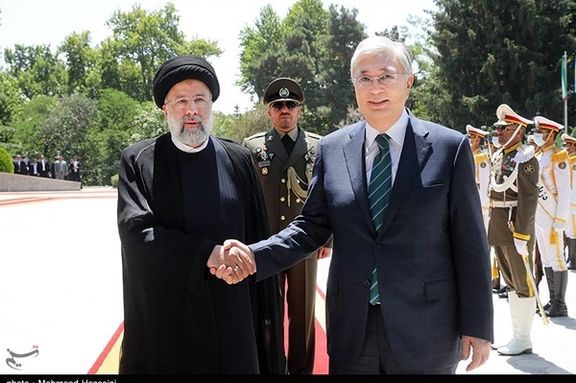
Kazakhstan's president arrived in Iran June 19 at the head of a high-ranking delegation to hold talks with his counterpart Ebrahim Raisi on issues of mutual interest.

Kazakhstan's president arrived in Iran June 19 at the head of a high-ranking delegation to hold talks with his counterpart Ebrahim Raisi on issues of mutual interest.
Kassym-Jomart Tokayev, who came to Iran at the invitation of his Iranian counterpart, was welcomed by Raisi at Saad Abad palace on Sunday, which follows several other foreign visits to Tehran in recent weeks in a what could be a determined effort to show that the Islamic |Republic is not isolated internationally.
Iran’s state media said that officials from the two countries signed nine Memoranda of Understanding (MoUs) on transit and transportation, scientific and cultural exchanges, agriculture and other fields in a session overseen by the presidents.
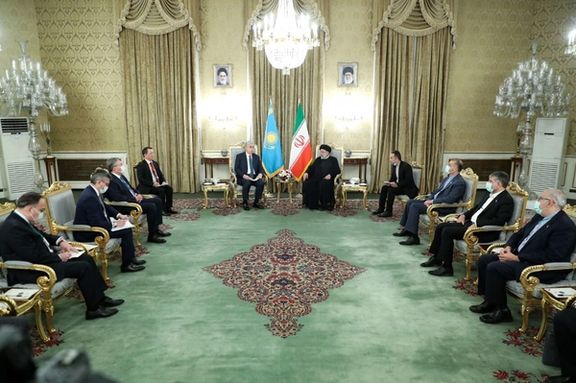
Speaking in a joint press conference with his Kazakh counterpart after the signing ceremony, Raisi claimed bilateral trade ties have increased in recent months, adding that the volume of transactions should reach $3 billion, which sounds far-fetched given the current figure of about $265 million according to the country’s customs administration.
Just recently, Raisi welcomed Turkmenistan’s new President Serdar Berdimuhamedow and signed documents for bilateral economic cooperation, and a day earlier, Pakistani Foreign Minister Bilawal Bhutto Zardari was in Iran to bolster ties.
The Raisi administration has promulgated once and again that its foreign policy is focused on expanding relations with neighbors, a policy hailed by the Supreme Leader.

A sixfold rise in animal feed prices in Iran has brought about a wave of bankruptcy among cattle breeders, forcing them to sell their starving or half-dead cows at lower prices to slaughterhouses.
According to a report by Shargh Daily on Sunday, there are long queues of cattle at slaughterhouses as the supply is high and demand low due to the dire economic situation in the country.
The chairman of the Livestock Supply Council, Mansour Purian, said the livestock have become weak and lost a lot of weight, adding that such cheap cattle have a lot of customers in the Arab countries, so smugglers sell these half-dead cows to them to be fed on their equipped farms.
On the other hand, low purchasing power by Iranians has drastically reduced the demand for meat by as much as 50 percent in the past year, which has caused many small farmers to be eliminated from the supply chain.
Criticizing the government’s decision to increase livestock feed prices, Nasser Ostad-Ahmadi, the managing director of one of Iran’s largest farmers' cooperatives, told the daily that “in the history of Iranian animal husbandry, both before and after the revolution, it had never been seen that the government increases the price of a commodity sixfold overnight.
Soybean meal, barley and corn for livestock and chicken feed are mainly imported from Russia and other countries. Any shortages or higher prices can push up the price of meat further.
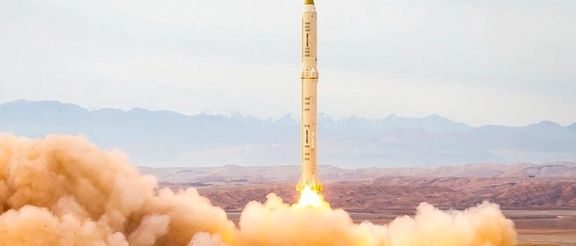
A hardliner newspaper in Iran has called for a “formidable blow” against Israel inside its territories, for Israeli operation in Iran and to restore Tehran’s credibility in the region.
In its Sunday issue, Resalat, a publication that belongs to Iran’s traditional conservatives with no direct link with military hardliners, has argued that repeated Israeli attacks in Iran have robbed the Islamic Republic of its image as a regional power.
The article presented at the top of the main page as a an “editorial note” and headlined “Strategic Patience Against Israel Is Meaningless”, has argued that the reason world powers negotiated with Iran was because they took it seriously as a regional power. With repeated attacks against targets inside Iran, Israel has aimed to raise doubts about the Islamic Republic’s power.
Resalat argues that previous Israeli attacks in Syria and elsewhere against Iranian officials and interests “were painful” but not as serious as attacks in “Tehran, Esfahan and Yazd.”
The paper is referring to what many are convinced are Israeli operations in Iran that started in July 2020 and inflicted heavy damage on key nuclear scientist installations and killed important figures, such as the top nuclear scientist Mohsen Fakhrizadeh in November 2020 in Tehran. These attacks were extremely complex operations, which showed that those behind it had infiltrated the country and possibly even the government and security agencies.
The attacks have indeed become painful for the clerical regime perhaps more for the political damage they have inflicted on the image of a ruling system that has failed economically and its only claim to power emanates from its extensive military and intelligence structures and their influence in other regional countries.
Resalat says that Israeli attacks have led to an atmosphere of insecurity in Iran and are aimed at portraying the government as weak in the region. It goes on to argue that with the power of its regional proxies and its ballistic missiles aimed at the heart of Israel, the Islamic Republic could project power in recent past, but now these levers seem to be inadequate, and a more powerful response is needed.
“The length and breadth of the Zionist enemy’s territory from Tel Aviv to Haifa and to its nuclear installations in Dimona are within the range of Iran’s precision missiles,” Resalat says. “Our allies from north and north-east to south-east dominate the occupied territories [Israel],” it goes on to say.
“There is no reason to doubt that Iran’s long arm should inflict a formidable and unexpected blow on the enemy to instill regret, and it is important to inflict simultaneous blows inside the occupied territories,” the hardliner paper says.
But the editorial note does not stop there. “Even inflicting blows against the interests of Israel’s allies, especially America and Britain is a proposal worth noting and one of the options on the table,” it says and adds, “One must punish the father so the child takes notice”.
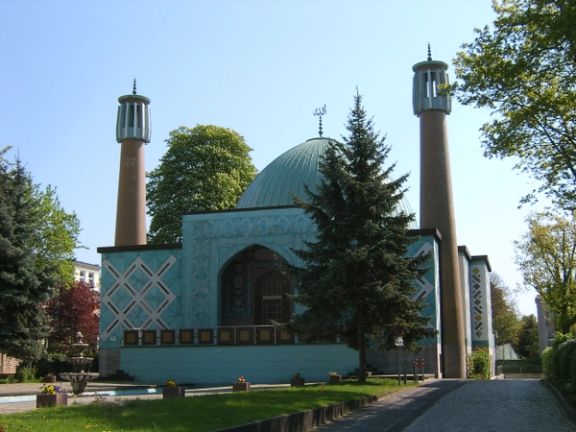
Germany has expelled an Iranian cleric who was the deputy head of the Islamic Center in Hamburg (IZH) from the country for his support for Shiite extremist and terrorist organizations.
According to a report by German newspaper Hamburger Morgenpost on Friday, Soleiman Mousavifar was served with a so-called expulsion order and has to leave Germany immediately or he will face deportation to his home country Iran.
In addition, an entry and residence ban was also imposed on him and if he violates the ban, he can face up to three years in prison.
According to the German authorities, Mousavifar, who shared Shiite extremist propaganda videos on Facebook, supports militant and terrorist organizations and has maintained links to two fundraising organizations working for Iran-backed Hezbollah – banned in Germany -- as well as close contacts with its representatives in Lebanon.
A Senator in Hamburg, Andy Grote told the "Bild" newspaper that "Anyone who demonstrably supports terrorist organizations or terrorist financiers represents a serious threat to our security. From my point of view, the immediate consequence could only be expulsion."
Earlier in the year, the Hamburg Shura Council -- an association of Muslim organizations that represents around 40 mosque communities and other Islamic institutions in the city -- removed the IZH from its board of directors for allegations that the center is Iran’s “long terrorist arm” in Europe.
In July, the German Office for the Protection of the Constitution also found evidence that the head of the IZH – known as Iran’s most “important propaganda center" -- Mohammad Hadi Mofatteh, is himself a member of the Revolutionary Guards.
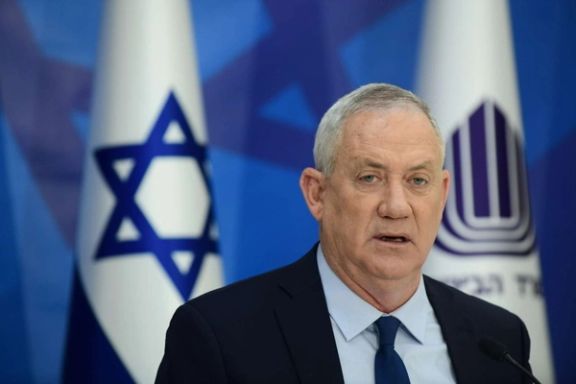
Despite repeated statements from Israeli officials warning of impending Iranian attacks on its citizens visiting Turkey, Tehran has generally remained silent.
Israeli officials and media began issuing the warnings in the end of May and intensified alerts at the beginning of this week. Defense Minister Benny Gantz issued his latest statement on Saturday reiterating that there is a serious risk of attacks on Israelis in Turkey by Iranian networks.
“I call on all Israelis in Turkey to obey the instructions of the security forces,” Gantz said in a statement published by his office Saturday evening, adding, “Israel is working to thwart Iranian attempts to carry out an attack, and is preparing to respond forcefully to any attack on Israeli citizens — anywhere."
But Iranian officials have not directly responded to the serious accusations. Only Tasnim news agency affiliated with the Revolutionary Guard commented that the Israeli warnings to its citizens is “psychological war” against Iran.
Several individuals affiliated with the Revolutionary Guard have been killed or died mysteriously in recent weeks in Iran. These incidents are attributed to a covert war waged by Israel inside Iran. On Sunday, the hardline Resalat newspaper called for a hard response inside Israel to protect Iran’s reputation as a power in the region, but no mention was made of Israeli warnings about attacks in Turkey.
Gantz’s warning came two days after an Israeli media report on June 16 that Turkey bluntly warned Iran not to use its territory for anti-Israeli acts.
So far there have been no incidents, but Israeli officials have been insisting that they are in close cooperation with Turkish security agencies to thwart any Iranian threat.
Although Turkish officials have been generally silent about the threat, but this could be due to the timing of the Israeli warnings coming at the beginning of Turkey’s tourism season. However, Ankara has not denied warnings of an Iranian threat coming from Israeli officials and media.
The silence from Tehran, however, might be more telling. The Islamic Republic finds itself in isolation, after earlier this month the International Atomic Energy Agency’s board of governors representing 35 nations, in a resolution passed with overwhelming majority criticized Tehran for lack of cooperation in an ongoing investigation of its past nuclear activities.
The debate in Iran now is about how to deal with the situation at hand and with a possible threat of more punitive actions by the United States and its European allies on the nuclear issue.
Moreover, Iran’s internal situation is becoming more precarious, with the economy seemingly in chaos and daily anti-government protests continuing since early May.
With strong public frustration over high inflation and government mismanagement, Iran’s leaders know that the people see this from the prism of their confrontational foreign policy. This could be one reason why they prefer not to remind the people of adventures abroad.
It is also possible that they know if they try to deny the Israeli accusations, information about the existence of a real threat might be revealed.
Israel channel 12 on Saturday reported that Israel’s Mossad and Turkish intelligence services had thwarted an attack over the past day, but no details or concrete source was mentioned.
“There are Israelis who were minutes from death and do not know it,” an unnamed defense official told Channel 13 news on Saturday according to Times of Israel. “Another day where we let out a sigh of relief that the attack did not happen.”
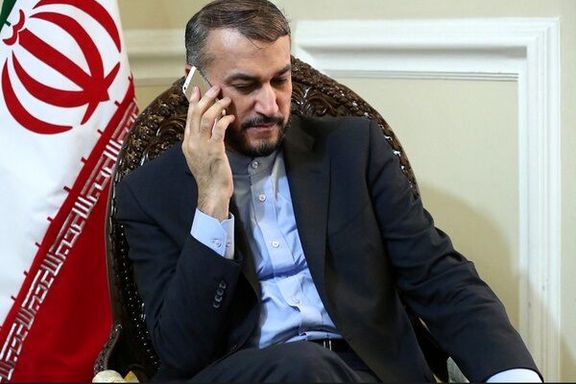
The Iranian foreign minister criticized the US for "the counterproductive and hasty" move over the resolution passed by the International Atomic Energy Agency's Board of Governors.
In a phone conversation with European Union foreign policy chief Josep Borrell on Saturday, Hossein Amir-Abdollahian said “in order to reach a good and lasting agreement, it is necessary for the other side to give up its double standards and contradictory behavior."
He added that the Islamic Republic still believes that "diplomacy is the best and most appropriate" solution to the outstanding issues on the revival of the deal,” reiterating that "Iran has never distanced itself from the negotiating table.”
“If the United States wants to continue its unconstructive behavior, it will face our proportionate response," Amir-Abdollahian emphasized.
The resolution called on Iran to engage with the IAEA without delay and expressed “profound concern” at Iran’s failure to satisfy the agency over traces of uranium found at three undeclared sites and highlighted earlier in June in a report by IAEA Director General Rafael Grossi.
The resolution came as year-long talks paused since March between Iran and five world powers aimed at reviving the 2015 Iran nuclear deal, the JCPOA (Joint Comprehensive Plan of Action).
Following the resolution, Iran retaliated, telling the IAEA it plans to remove more monitoring equipment, but intends to maintain a basic level of monitoring and inspectors’ access as required under the Nuclear Non-Proliferation Treaty (NPT).